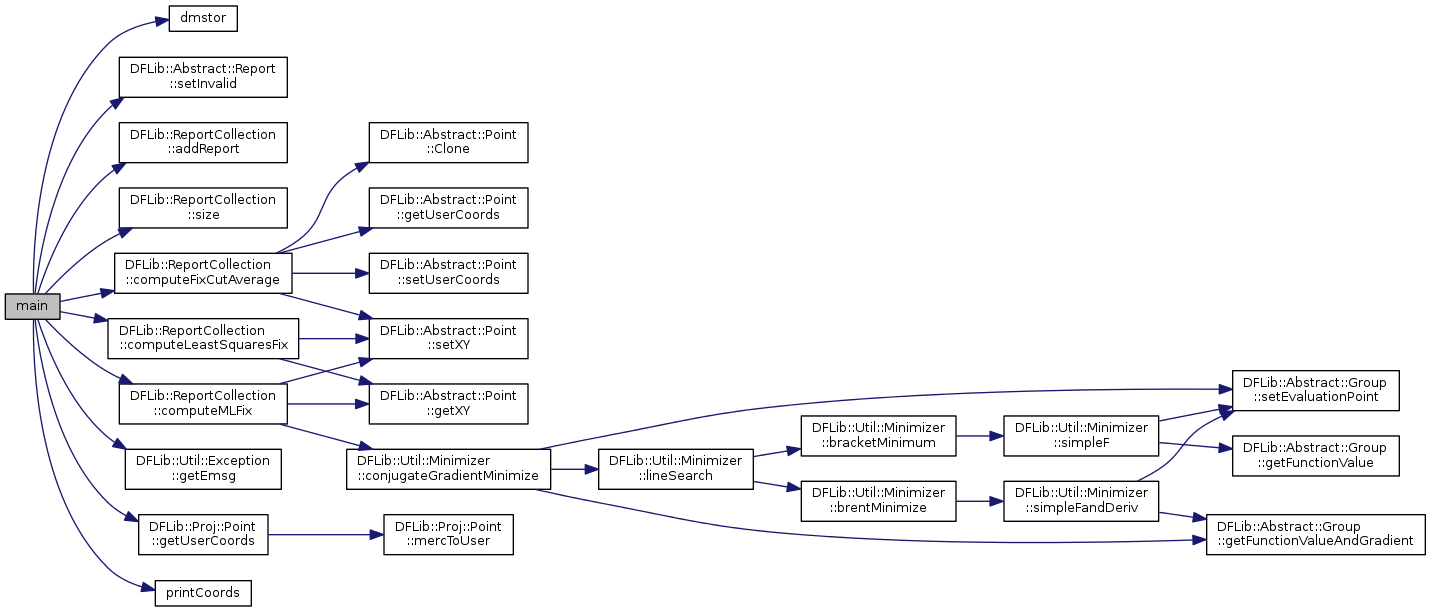#include <cmath>#include <iostream>#include <fstream>#include <vector>#include <proj.h>#include "DFLib_Misc_Defs.h"#include "DF_Proj_Point.hpp"#include "DF_Report_Collection.hpp"#include "DF_Proj_Report.hpp"#include "Util_Misc.hpp"
Macros | |
| #define | MAG_DEC (9.8) |
Functions | |
| double | proj_dmstor (const char *, char **) |
| void | printCoords (const std::vector< double > &latlon, const std::string &text) |
| int | main (int argc, char **argv) |
Macro Definition Documentation
◆ MAG_DEC
| #define MAG_DEC (9.8) |
Function Documentation
◆ main()
| int main | ( | int | argc, |
| char ** | argv | ||
| ) |
A very simple text-based DF fixing program demonstrating how to use DFLib classes.
SimpleDF takes as command line argument the name of a text file with lines in the following format:
NAME LONGITUDE LATITUDE BEARING Datum STDDEV VALID
where longitude and latitude are in PROJ.4 format, Bearing is magnetic bearing IN CENTRAL NEW MEXICO IN 2009, Datum is 1 for WGS84/NAD83 and 0 for NAD27, stddev is the standard deviation of bearing error expected for the equipment and user, and VALID is 0 for invalid and 1 for valid reports.
The magnetic declination is hard-coded here as 9.8 degrees, which is the correct declination in Albuquerque, NM in mid-2009. The user must change the appropriate line of code to fix this for the region and date.
The DF reports in the input file are input into a DFLib::ReportCollection, and the various DF fixes computed. The fixes are printed to standard output.
This primitive program shows how to use the DFLib report classes. It does very little error checking of the fixes after they're computed. testlsDF_proj.cpp actually does more error checking. This program is not intended as a finished product, but as a demo.
The program was not updated to compute Stansfield fix after the Stansfield fix was implemented in DFLib.
Neither was the program updated to compute the Maximum Likelihood fix more aggressively than by the conjugate gradient method. See the program "testlsDF_proj.cpp for how to call the more aggressive ML computation when the simple conjugate gradients method fails due to flatness of the cost surface.

◆ printCoords()
| void printCoords | ( | const std::vector< double > & | latlon, |
| const std::string & | text | ||
| ) |

◆ proj_dmstor()
| double proj_dmstor | ( | const char * | , |
| char ** | |||
| ) |
